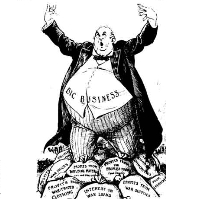GM Bankruptcy and Executive Greed: Les Leopold
Thursday, June 04, 2009

What destroyed General Motors goes beyond specific business decisions made by the automakers’ former executives, argues Les Leopold, author of The Looting of America and director of the Labor Institute and the Public Health Institute. Excessive greed by corporate elites and obscene gaps in income equality played significant roles in the demise of GM and the well-being of the nation’s economic health, as the top 1% of the nation has grown super-rich and completely removed from any semblance of living an ordinary life.
According to Leopold, in 1970, the average of the top 100 CEOs earned 45 times as much as the average American worker. By 1990, the ratio had grown to 321 to 1. Then the gap between the super rich and everyone else really started to widen. By 2006, the average top 100 CEO was raking in 1,723 times the income of the average American worker.
Leopold says the rising CEO wage gap that began in the 1970s is “a stark indicator of a destabilizing flaw in our economy,” when a sliver of the population is able to garner “the lion’s share of rising GDP.” Conservative economists at the time (and even now) claimed this concentration of wealth would be a good thing for everyone, as the corporate titans invested their expanded riches into new industries, creating “more jobs and rising wages for the rest of us.”
But, as Leopold points out, “In reality, real average worker wages stalled throughout the past three decades instead of being lifted by the market-utopian rising tide.”
To make matter worse, so much money eventually “drifted to the top that the super wealthy literally ran out of productive investments,” he writes, leading to the catastrophic blunders in recent years of pouring billions of dollars in high-risk derivatives.
Leopold also cites the work of economists Jamal Rashed and Subarna Samanta, who demonstrated the dangerous correlation between rising income gaps and financial crashes. “They concluded that when the discrepancy between rising productivity and wage stagnation is large, ‘stock markets crash, banks fail, currencies depreciate, unemployment rises, and a longer recession or a full-fledged depression may follow.’”
-Noel Brinkerhoff
Fear and Looting in America: What Really Caused the GM Bankruptcy? (by Les Leopold, Huffington Post)
- Top Stories
- Unusual News
- Where is the Money Going?
- Controversies
- U.S. and the World
- Appointments and Resignations
- Latest News
- Trump Renames National Football League National Trump League
- Trump to Stop Deportations If…
- Trump Denounces World Series
- What If China Invaded the United States?
- Donald Trump Has a Mental Health Problem and It Has a Name






Comments